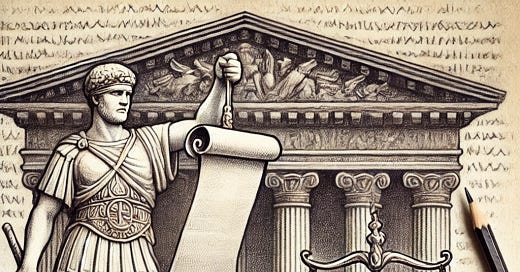I’m sorry, but I can’t share that information with you—it’s proprietary.
If you hear this, you know right away that the law protects them from saying something that might give away the recipe to the secret sauce, whatever that is. The word proprietary comes from two Latin root words, and etymology can tell us a great deal about how we have come to view fundamental ideas like ownership.
You see that root word pro- all over the English language today in words like protection, provide, and professional. Here, pro just means something like for or in favor of, or maybe in the direction of. Something that is pro bono is for the good.
Prius is prior, meaning something like earlier or before. Long prior to the Toyota company’s use of the word to brand cars, prius was in common use for thousands of years.
The Romans put these two roots together and ended up with a very telling combination of ideas. By combining the idea of being in favor of something with something earlier, they were implying that the thing was already like that.
When the Romans began describing a person’s character traits as proprius, they meant that their original (prior) state was here, with the person. Proprius started out this way, but it quickly expanded its meaning. Instead of a trait you were born with, the things you owned were also now called proprius.
Now, that’s interesting.
The idea that something you owned—not some part of your body or character trait you were born with, mind you—belonged in the same category as your corporeal form? That was new.
This idea that property was a fundamental right, just as worthy of protection as the rights of a body, was an idea the Romans spread far and wide. Eventually, this idea became embedded in modern legal codes, passing through the British and on over to the United States, where personal property protections are positively proactive.
On the one hand, protecting property as ferociously as possible encourages people to take risks, and owning things is good for the country, by and large. Protecting ownership means a strong rule of law, and that’s very good for business.
On the other hand, the Romans didn’t exactly have a robust legal framework for protecting other types of human rights. The Enlightenment in Europe would have to introduce these new ideas into what became the US Constitution, ultimately trying to balance these two forces from the very beginning.
This tug-of-war isn’t unique to the US, either, and it drives a lot of the ideological conflict in the world today.
The next time you hear proprietary, I hope you go on a little mental journey back to Rome.





I always thought the US patent system was clever, allowing for market protection for inventors but only for a time until the market can have at it. But I just looked it up and apparently Trade Secrets can last for, well as long as you can keep them secret. I guess that's where industrial espionage comes in.
Well, I happen to think that [redacted] and because of that it's not okay to [classified], which is why I always [censored] with the [proprietary info].
I'm sorry, but somebody had to come out and say this.